Julian Assange’s prison life as mum lashes out and Australian supporters call for him to be freed
WikiLeaks founder Julian Assange gone from being in a small room at the Ecuadorian embassy in London to a cell at Belmarsh Prison, where he has certain advantages he didn’t have before.
Crime in Focus
Don't miss out on the headlines from Crime in Focus. Followed categories will be added to My News.
WikiLeaks founder Julian Assange has exchanged a small room at the Ecuadorian embassy in London for a cell at Belmarsh Prison, a grim institution in the city’s southeast where he nevertheless has certain advantages he didn’t have before.
WikiLeaks editor-in-chief Kristinn Hrafnsson says the ailing Assange should finally be able to receive medical care and will be able to meet with his lawyers more easily than he could in the embassy.
A feud with Ecuadorian authorities had led to a ban on most guests for the 47-year-old, who has extreme shoulder pain and tooth pain, Hrafnsson said on Friday.
For nearly seven years, Assange lived in the embassy without taking a step outside for fear of being arrested and sent to the US to be prosecuted. British authorities dragged the Australian from the embassy on Thursday and US authorities announced charges against him of conspiring to break into a Pentagon computer, setting up what is expected to be an epic legal and political battle over whether to extradite him to the US.
Hrafnsson said the prison where Assange is being held has medical facilities and presumably access to dental care and a garden.
“But comparing one prison to another and giving a star rating is not really what’s on my mind,” he said.
“What’s on my mind is there’s an innocent man in prison for doing his job as a journalist, and that’s an outrage.” He said Assange is in relatively good mental condition considering the stress of recent days.
MORE ON ASSANGE:
WikiLeaks’ Assange legal war heats up
How Assange’s ‘diva demands’ shocked embassy staff
Analysis: How Assange made a fatal mistake
PM on Assange: 'There is no special treatment'
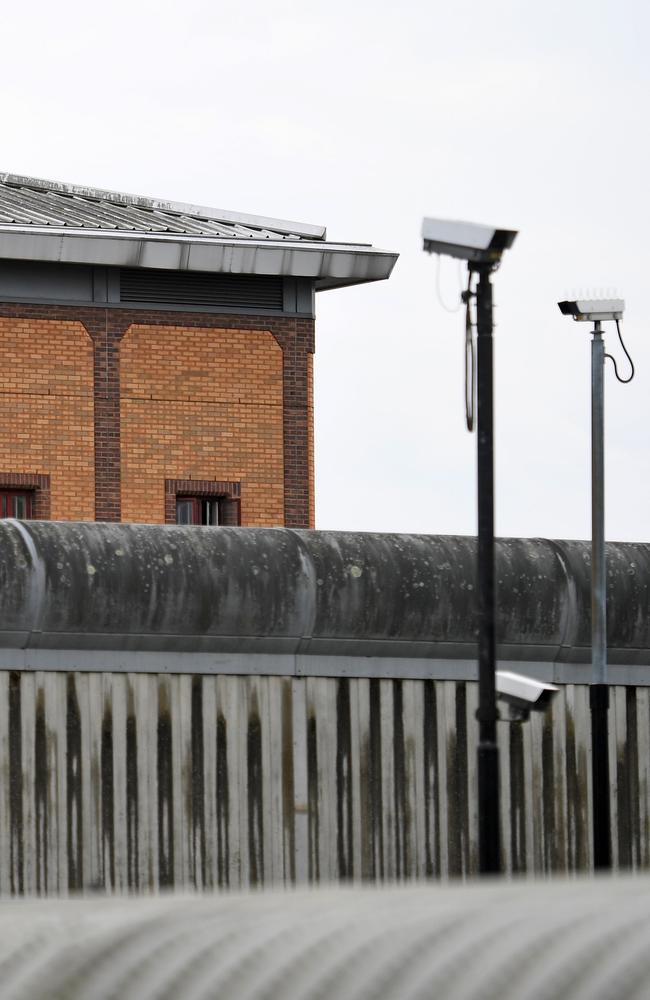
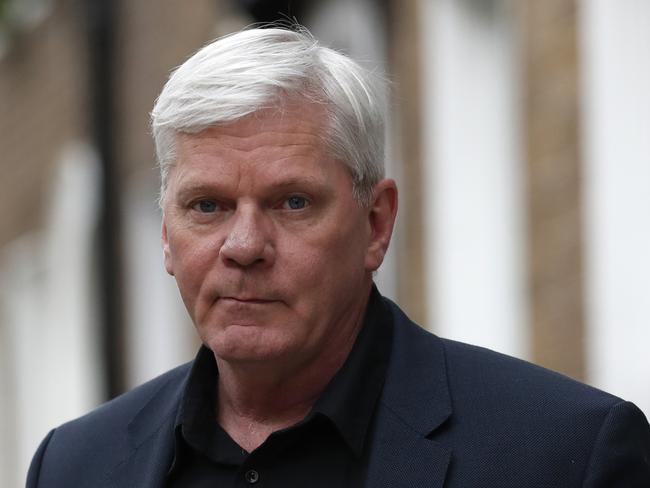
ASSANGE’S MUM LASHES OUT
His mother has attacked British Prime Minister Theresa May, Ecuador’s president and the judge who branded her son a “narcissist” in a stream of tweets.
Pledging to “fight like hell”, Christine Assange said Mrs May was “trying to divert attention away from her Brexit dog’s breakfast by cheering on the thuggish, brutal, unlawful arrest of my courageous, tortured multi-award winning journalist son Julian!”
Mrs Assange, who lives in Australia, tweeted and shared articles regularly after her son was seen being forcibly removed from the Ecuadorean embassy.
Addressing the country’s president, Lenin Moreno, she tweeted: “Shame on you @Lenin #Moreno! May the Ecuadorean people seek vengeance upon you, you dirty, deceitful, rotten traitor!
“May the face of my suffering son haunt your sleepless nights.. And may your soul writhe forever in torturous Purgatory as you have tortured my beloved son!”
Assange was taken to Westminster Magistrates’ Court after his removal from the embassy on Thursday.
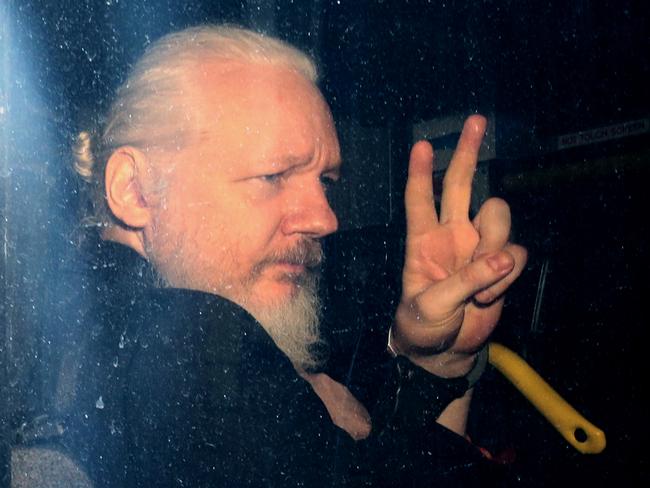
District Judge Michael Snow described his behaviour as “that of a narcissist who cannot get beyond his own selfish interests”.
His mother tweeted: “UK judge should NOT be making statements like this! This is rubbish Legal process!”
On Friday morning UK time, she issued a plea to police, prison officers and court staff.
She said her son had been “detained without charge”, “deprived of fresh air, exercise and sun” and “denied proper medical/dental care” for several years. She also claimed he had been “isolated/tortured” for a year. “Please be patient, gentle & kind to him,” she tweeted.
JULIAN ASSANGE’S FEAR IN JAIL
Julian Assange is wanted in the United States on a charge that carries less jail time than the period he confined himself in the Ecuadorean Embassy.
But the 47-year-old Australian will fight extradition to the United States, fearing he could face other, more serious charges including espionage, which could land him behind bars for decades if he was convicted.
Swedish prosecutors have also confirmed they have started a preliminary investigation into whether the two sexual assault cases they were considering against WikiLeaks founder Assange, which were later dropped, can be reopened.
Assange remains in custody in London, after being dragged handcuffed and ranting from the embassy, 2487 days after he arrived there trying to avoid extradition to both Sweden, and the United States.
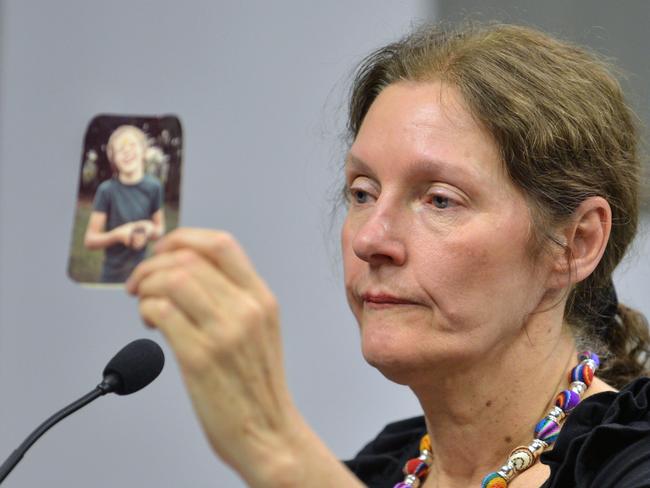
Five hours after his undignified exit from the embassy, he was convicted by the UK courts of breaching bail back in 2012, and is now facing a jail term of up to 12 months.
He must serve out that term before any foreign government obtains his extradition. His high-powered legal team, which includes Australian human rights barrister Geoffrey Robertson and another Australian, Jennifer Robinson, have vowed to fight any extradition bid, setting the stage for legal battles likely to run for years.
Ms Robinson said outside court that they would fight any extradition, and “the precedent means that any journalist can be extradited for prosecution in the United States for having published truthful information about the United States”.
However, the US has so far avoided the free speech argument by charging Assange with computer hacking, not publishing the documents obtained.
The US said he is currently wanted only on a charge of conspiracy to commit computer intrusion.
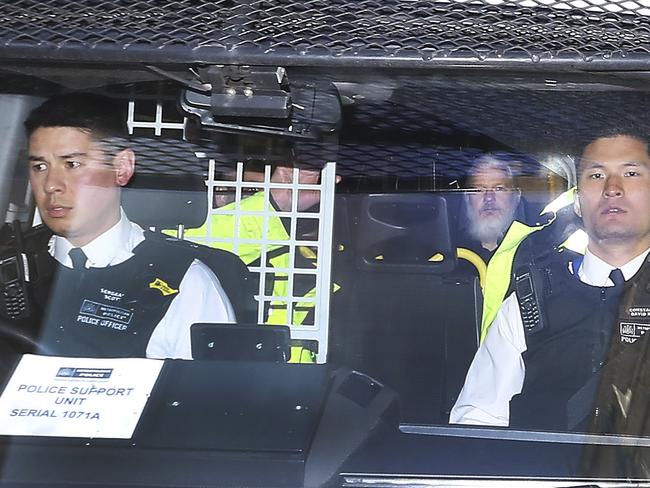
The charge carries a maximum jail term of five years — less than the almost seven years Assange had spent cooped up in two small rooms in the Ecuadorean Embassy.
His co-accused, former US Army analyst Chelsea Manning, was held in detention from 2010 and sentenced to 35 years’ jail in 2013, but served just less than seven years after former US president Barack Obama commuted her sentence in 2017.
She is now back behind bars for refusing to testify against Assange.
Assange, whose WikiLeaks website published around 750,00 documents and videos obtained by Manning, is accused of conspiring with Manning in 2010 to crack the passwords of secure Defence Department servers and releasing information that “could be used to the injury of the United States and the advantage of a foreign nation”.
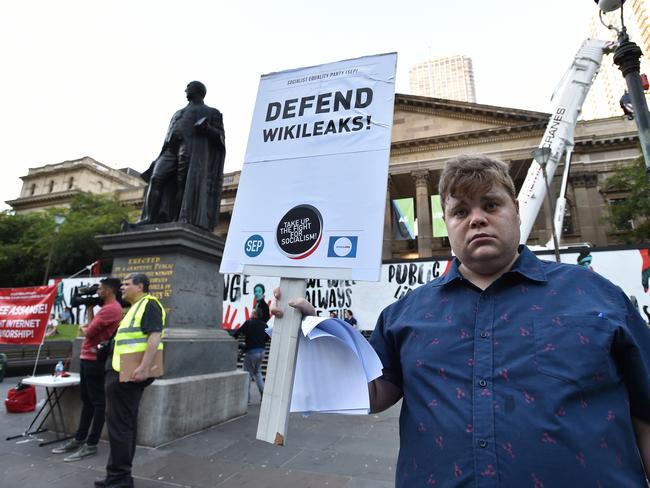
“During the conspiracy, Manning and Assange engaged in real-time discussions regarding Manning’s transmission of classified records to Assange,’’ the US Justice Department indictment claims.
“The discussions also reflect Assange actively encouraging Manning to provide more information. During an exchange, Manning told Assange that “after this upload, that’s all I really have got left.” To which Assange replied, “curious eyes never run dry in my experience.”
UNITED NATIONS WORRIED ABOUT US TRIAL FOR ASSANGE
A United Nations special rapporteur on torture and other cruel, inhuman or degrading treatment, Nils Melzer, said that the manner in which Ecuador terminated Assange’s diplomatic protection broke international norms.
But Mr Melzer made clear that his greatest concerns for the WikiLeaks founder stem from Assange’s possible extradition to the US.
“I’m worried about fair trial,” said Mr Melzer, one of several UN rapporteurs active on the Assange case.
“I’m worried that he might be exposed to (the) detention practices of the United States, which in part are very problematic,” he added.
“The United States in the last decade unfortunately has not proven to be a safe state with regard to the provision of torture in cases that involve national security,” Mr Melzer added.
The US request to extradite Assange is set to be heard in British court on May 2.
US officials have unsealed an indictment against him for computer hacking as part of his WikiLeaks whistleblowing activities.
But Melzer echoed concerns that the US charge sheet could be expanded, especially if the Justice Department gets Assange on US soil.
The UN expert argued that regardless of one’s personal view of Assange, “from a human rights perspective, he was basically doing the same thing that investigative journalists do all over the world,” by publishing information that states try to conceal.
Turning to the arrest, Mr Melzer conceded that “theoretically” Ecuador had the right to terminate Assange’s protection and strip his citizenship.
“But in a state that is governed by the rule of law, these types of steps are to be taken in a procedure that is subject to legal remedies and appeals,” added Mr Melzer, a Swiss national who also teaches international law at the University of Glasgow.
The “shortcuts” taken in the run up to the arrest are “very, very problematic,” he said.
“The rule of law is not being respected.”
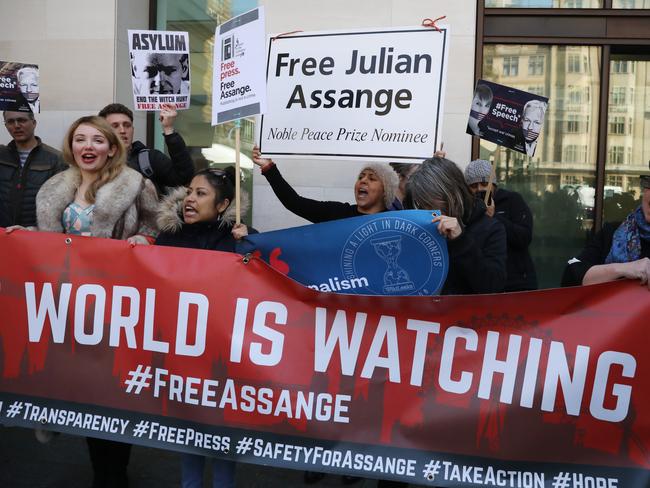
ASSANGE LAWYERS WANT AUSTRALIA TO ACT
Ms Robinson called on the Australian Government to intervene, saying: “The Australian Government ought to be defending its citizen and asking the US to stop this.”
But the Coalition and Labor showed minimal interest in assisting Assange.
Prime Minister Scott Morrison said Assange would “get the consular assistance as you would expect him to but he will have to make his way through whatever has come his way in terms of the justice system there.”.
The PM told Sunrise he had not personally made any calls on Assange’s behalf to the US or the UK.
Opposition Leader Bill Shorten said Assange should be entitled to consular assistance from Australia, but “no more, no less”.
“I don’t know what’s gone on in the last seven years in the Ecuadorean embassy, and I suspect that will come to light over the coming days,” Mr Shorten said.
“He’s an Australian, so therefore he is entitled to consular assistance — no more, no less, but he’s certainly entitled to consular assistance, I notice the government has said the same thing.”
US President Donald Trump yesterday sought distance from Assange, saying he didn’t know him, he didn’t know much about WikiLeaks, and “I don’t have an opinion’’ on the arrest.
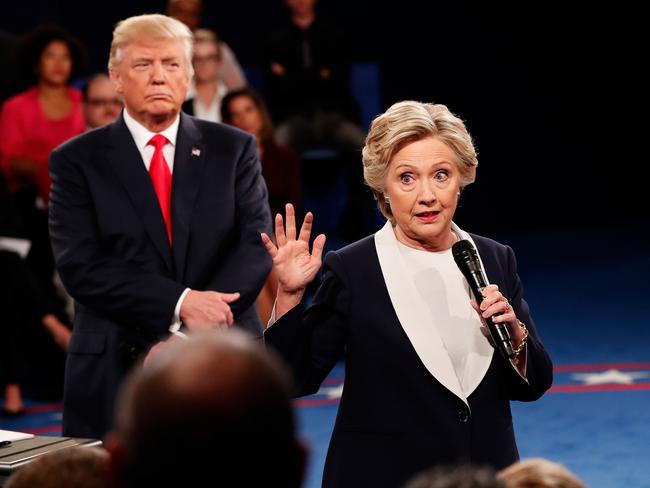
By contrast, when Assange was publishing emails damaging to Hillary Clinton’s campaign in 2016, Mr Trump had said: “I love WikiLeaks’’ and described it as a “treasure trove.’’ Those documents were found to have been hacked from the Democrats servers by Russian operatives, and passed on to WikiLeaks.
Also yesterday the lawyer for one of the women who accused Assange of rape in Stockholm in 2010, Massi Fritz, said “we are going to do everything” to have the case reopened “so Assange can be extradited to Sweden and prosecuted for rape”.
Sweden’s Deputy Chief Prosecutor Eva-Marie Persson responded, saying: “We will now look into the matter and determine how to proceed.’’
AUSSIES PROTEST TO FREE ASSANGE
Australia said on Friday it would oppose the death penalty for Julian Assange if he’s extradited to the United States, as protesters in Sydney and Melbourne called for his release and Australia’s journalists’ union voiced its strong support for him.
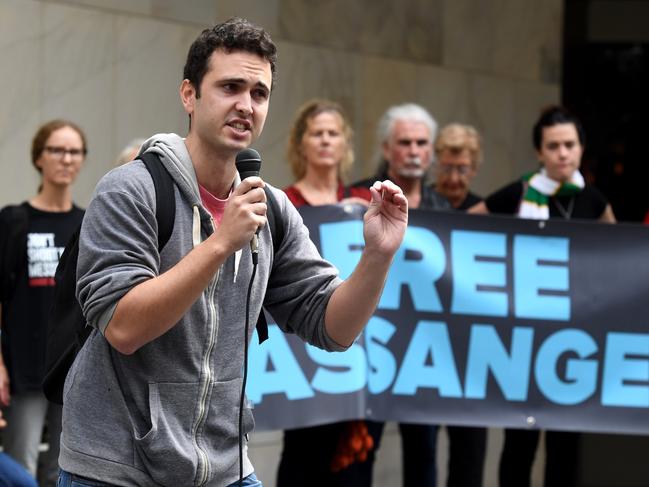
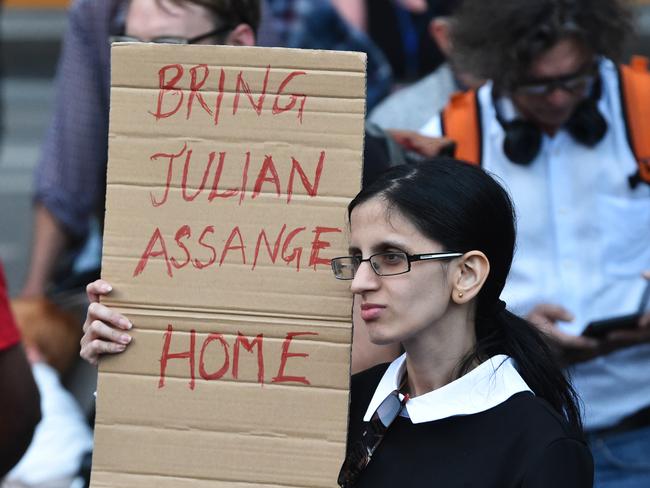

Signs of support for Assange emerged in his home country on Friday, where about 30 people marched in central Sydney after gathering outside the British Consulate and calling for the release of a figure they regard as a crusader for truth, and freedom of speech.
Holding signs with messages including “Free Assange — No US extradition,” they chanted: “Free the truth; Free Assange; Don’t shoot the messenger.” Another march in support of Assange was due to take place in Melbourne later on Friday.


ASSANGE'S WORDS AS HE WAS ARRESTED
When police finally got the call they’d waited almost seven years for — inviting them into the Ecuadorean Embassy to arrest Assange — they made their way in a convoy through peak-hour traffic to Knightsbridge, and parked on the street outside.
Plain-clothed officers from the Metropolitan Police entered the embassy, which shares a handsome, six-storey building with the Embassy of Colombia, right next door to the tourist magnet and shrine to retail excess, the Harrod’s department store, formerly owned by Mohamed el Fayed, father of Princess Diana’s late boyfriend Dodi.
James Hines, described as a representative of the US Government, appeared at Assange’s court
hearing some hours later, and told the courtroom what happened when police arrived at 9.15am.

According to Mr Hines, once inside the front doors, police spent some time talking to the
Ambassador, Carlos Abad Ortiz, who told them Assange’s asylum was going to revoked, and
documents served on him to that effect.
At 10am, the Ambassador met with Assange, in front of the police officers.
Officers sought to introduce themselves to execute the warrant, and, according to Mr Hines,
Assange tried to push past them to get back into his private rooms.
At 10.15am he was arrested.
Mr Hines said Assange yelled his detention was unlawful and he struggled until he was placed in handcuffs.
As he was being led out, still clutching a book by Gore Vidal, Assange said: “This is unlawful. I’m not leaving.’’
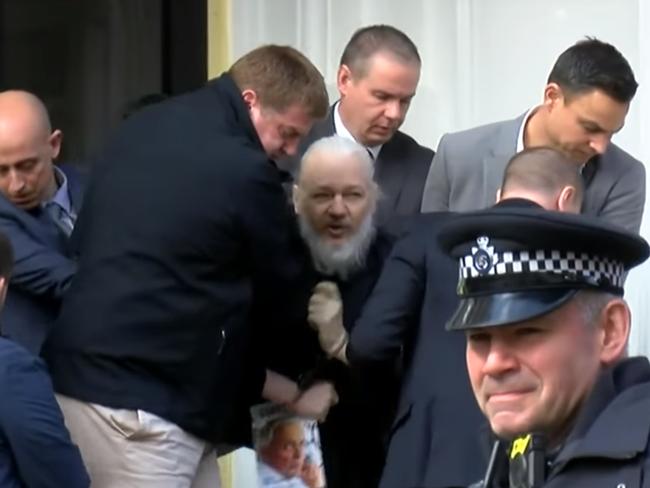
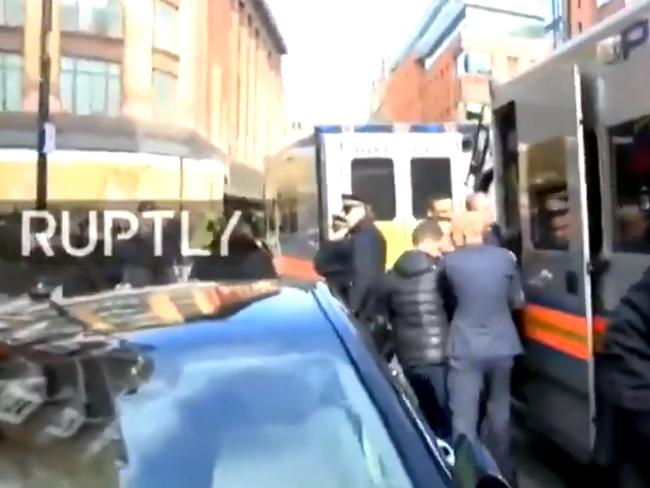
He was then lifted bodily into the van and taken to the West End Central police station.
The arrest was captured on live-stream by Russian video agency Ruptly.
At 10.33am, the Metropolitan Police confirmed Assange had been arrested and taken to a central London police station.
At 10.53am, Assange was “further arrested on behalf of the United States authorities, at 10:53hrs after his arrival at a central London police station.
This is an extradition warrant under Section 73 of the Extradition Act,” a Scotland Yard statement confirmed.
At 2.15pm, Assange appeared in the Westminster Magistrates Court — the same court from which he jumped bail in 2012.
He pleaded not guilty, but was quickly convicted, and will be sentenced in the Crown Court at a later date.


